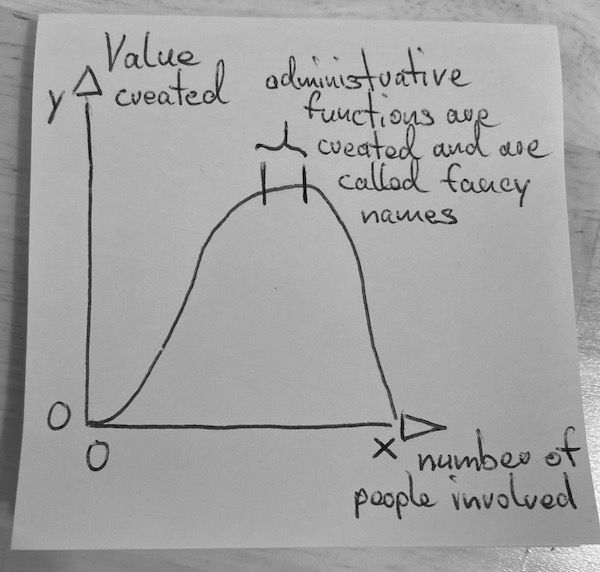Today, it will be quite short again because it is my aunt's birthday and tomorrow is my cousin's birthday. So, let's quickly move through it :)
Last week, I purchased an iPad because I would like to draw more ideas which come to my mind. You might ask: Dude, is that the only reason? To be honest: Yes. Kind of exaggerated, you think? I disagree.
I always think about using a device in 2 different ways: Either you are
- consuming or
- producing/creating
As long as you purchase anything with the goal of producing more, I think it is always the best use case you can have.
So, let's see what I have produced: The paradox of too many people "contributing"
Problems are solved by people. It doesn't matter where you are right now: If you look around, it is very probable that more than 90% of what you see is humanly created. May it not have been created by a human hand. But at least the concept and the procedure of producing it was created in a human's mind.
And almost nothing can be created or produced by just one person; it is always a team of people which brings everything together.
So, that is what I tried to visualize in my first image created in the standard "notes" app on my iPad:

This image was originally created on a post-it during a frustrating client meeting:

It is so cliché, but it still blows my mind how many people are working in corporations without contributing anything of value to it, which I call "administrative functions with fancy names". It is quite the opposite: They even try to block/bother business-related endeavors and try to legitimize it with their function: "That's my job".
No, it is not: It goes against the nature of a business, a company when you do that. The highest goal you need to comply with, is not the directives or guidelines your boss (or even his boss) has written, but the success of your company.
The success of a company is usually created by small teams of high-performers who should be bothered as little as possible. As they usually are conscientious (that is why they are high-performers) enough to integrate the requirements of the fancy functions anyways, bothering them with security guidelines or compliance policies is not necessary.
The funny thing is that these "fancy functions" only exist in bigger companies because
- they are able to fund them due to their market position and
- power structures are more protected as there is much less transparency to what everybody is doing because of the scale.
In smaller companies (and teams), they are much more focused on getting shit done because they have to in order to survive.
Competitive pressure between employees should be much more highlighted as a positive thing within companies, in my opinion. Protecting people from critique and consequences related to their performance, their function or their job in general is a form of infantilizing them. While the ca. 40% working in big companies might profit from it, around 60% working in small or mid-sized companies do not.
That is why I loved the letter sent by Tobias Lütke to the employees of Shopify in which he said
„Shopify ist, wie jedes andere gewinnorientierte Unternehmen, keine Familie. Schon die Idee ist absurd. Sie werden in eine Familie hineingeboren. Man sucht sie sich nicht aus, und sie können einen nicht aus der Familie entlassen“
It means translated: "Shopify, like any other for-profit company, is not a family. The very idea is absurd. You are born into a family. You don't choose them, and they can't fire you from the family".
He proposed the sports team as a better metaphor. While also taking care of the people who might be "injured" or having "personal problems", he also emphasizes the implicit request to every team member:
„Außerhalb dieser Fälle müssen wir jeden daran erinnern, dass es wie bei jeder anderen wettbewerbsfähigen (Sport-)Mannschaft darauf ankommt, wie man jeden Tag auftaucht und zum Erfolg des Teams beiträgt“
Again, the translation: "Outside of those instances, we have to remind everyone that just like any other competitive (sports) team, it's how you show up every day and contribute to the team's success that matters".
